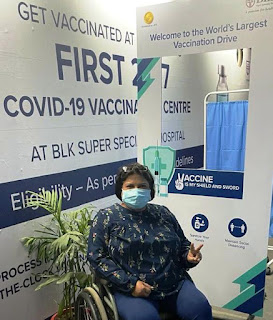COVID-19 Pandemic Lockdown: Disability Inclusion Must Go On
Date: 10 June 2021
The COVID-19 pandemic has exacerbated the vulnerability of people with disability to isolation and discrimination, affecting their right to live independently and be included in the community. The pandemic threatens to reverse gains achieved from years of advocacy that had started to ensure policies and programs were disability-inclusive in line with the UN CRPD. In such situations of humanitarian crisis, people with disabilities (PwDs) remain the most left out and deprived category in availing support and care.
No Looking Back
Using new communication technologies
such as WhatsApp, Samarthyam Team set up an active group of the APNO Organisation
of Persons with Disabilities (OPDs) under UNESCAP partnership project “Protecting
and empowering persons with disabilities in the context of the COVID-19
pandemic”. The project activities were planned in full swing; however, India
was hit by the second wave of the COVID-19 pandemic, bringing back lockdown all
over the country. Hence, the aim of the group formation is to share information
on the activities and plans under the said project and decide way forward
during lockdown.
As the COVID-19 devastation unfolded, the chaos spread and the confusion rose, this WhatsApp group became a useful platform for the OPD members. They shared information on governmental guidelines, vaccinations and other information regarding protection, prevention, treatment and access to essential services. The group started vibrant discussions on day to day challenges and concerns, which were common and could be remedied with governmental and non-governmental support. The issues identified in the WhatsApp group ranged from the need to give precise information on COVID-19 vaccination, protection mechanisms, need for training of personnel, need for home based vaccination for those with severely disabled and information on restrictions, services, etc. in accessible formats.
Leave No One Behind
With the
practical reality of disability inclusion falling through the cracks in the
governmental as well as the general response to the crisis, the PwDs had to
make many efforts to get disability concerns on board. A direct outcome of the
discussions was the need to have a National Guidelines/ Advisory for PwDs
clarifying the Do’s and Dont’s for themselves, caregivers and government. The
draft Advisory was sent for review to State Disability Commissioners of India,
higher officers in the State Social Welfare Departments and other OPDs. Samarthyam
sent the final version to Department of Empowerment of Persons with Disabilities,
Ministry of Social Justice & Empowerment, Government of India for notification.
Never before, had Samarthyam team been able to compile and document such a
large volume of technical advice in such a short period of time.
Lessons learnt
The active participation
of almost all the OPD members on the WhatsApp group showed how shared concerns
and discussions can help come up with solutions. We learnt that having such
easily accessible communication platforms for PwDs have several benefits
including:
ü
Help
people with similar interests or same departments to stay in touch and to
identify the issues at the grass root level.
ü
With
in-app calling available, it’s also cheaper and easier to connect with people.
ü
Spreading,
sharing and understanding of information.
ü
Sharing
of knowledge, experiences and providing recommendations happens at a faster pace
and evokes active participation.
ü
Women with
disabilities worked within their communities to address inequalities and create
an inclusive environment for everyone to build ‘forward’ better.
ü
Above
all, the WahtsApp group became a real-time platform connection between OPD
members and Samarthyam experts/ trainers on disability issues, when most needed.
Bureau of Indian Standards, Government of India
Indian Roads Congress, Government of India
Transport Research Board, USA



Comments
Post a Comment